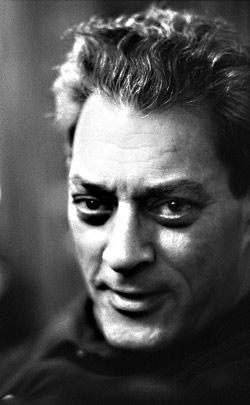Paul Auster is noted for two things: writing the wonderfully literary Wayne Wang (or rather Paul Auster/Wayne Wang) film Smoke; and tricksy metafictions that eschew David Foster Wallace–y bloat for Richard Ford–ish crispness and evince a Dickensian sweet tooth for coincidence. His new novel is much more like the former than the latter—the wraparound cover pointedly echoes Smoke‘s Brooklyn milieu. Nothing in this perky novel is anything like the cosmically alienated postmod feel of his City of Glass. It’s utterly straightforward, in a shaggy-dog-story way very like Smoke, and its brisk, episodic pace is delightfully movielike. Some fans may lament the passing of the Auster they loved, and bitterly suspect demon possession by the shade of Laurie Colwin (Happy All the Time).
Fuck them, I say. At least the first half of The Brooklyn Follies (Holt, $24) is lively and distinctive enough to make a name for an unknown novelist. Auster’s hero, Nathan Glass, perhaps influenced by Auster’s own past as an epic screwup at marriage (to a MacArthur “genius” grant winner) and career (“Everything I touched turned to failure,” he wrote in a memoir), goes to Park Slope to die. His plan is to use up his life savings and dwindling days after his wife boots his faithless ass out. He explains, “I was looking for a quiet place to die. Someone recommended Brooklyn.” It’s a nice Thomas Wolfe gag in a book crammed with nifty literary riffs, but Glass is a failure at death: His lung cancer treatment seems to have worked—not the outcome he’d sought.
Yet Nathan swiftly finds new life, via a chance encounter with his golden-boy nephew, Tom. After Nathan’s favorite sister died, he’d lost touch with her kid, his favorite relative. He’s startled to find Tom manning the register at a superb used bookstore in Park Slope. Turns out Tom has lived my own personal youthful nightmare: a prestigious English graduate fellowship leading to a taxi-driving job. Broken, now fat, and fast aging, Tom has snuffed his own spark with bad food and career despair that works great as New York Girl Repellent.
But he and uncle Nathan bring out the best in each other, and in Auster’s book. Meanwhile, Nathan’s compiling The Book of Human Folly, about “every blunder, every pratfall, every embarrassment, every idiocy” he ever heard of—sort of a cross between Causabon’s Key to All Mythologies and the opus composed by John Barth’s suicidal protagonist in The Floating Opera. Tom distracts him with his own more quirkily intriguing essays, fun stuff about the secret kinship of Poe and Thoreau, Kafka and Kleist, Jacob and Esau, and lyrical ballads to cabbie life.
Tom’s bookstore boss Harry Brightman inveigles them into his rapscallion plot to recapture his glory days as a con man—unfortunately for him, a con man ass over superannuated teakettle for the rough-trade love of his life. Tom’s sister Aurora, a former porn star who does a wonderful cameo in a scene involving a stroke book, mysteriously dispatches her 9-year-old daughter to live with him, and the girl is as mysteriously mute as Garp‘s Ellen Jamesians. They go on a picaresque road trip to find the kid a proper home—when, as we all know by now, she’s found her true home with these male misfits in Park Slope.
The characters shimmer, the anecdotes spark, the dialogue nimbly natters, the tale barrels along with the old-fashioned power of Nathan’s lime green Oldsmobile Cutlass. Problems increasingly occur: Comeuppances become predictable, there’s an epidemic of sentimental hookups, and porn-star Aurora ruins her effectiveness as an offstage character by appearing at last in a rescue melodrama that sucks. The 9/11 ending is unmoving, though perfectly consistent with Follies‘ theme, since the whole book is a yearning hymn to a lost prelapsarian world.
Still, New York Times über-critic Walter Kirn was wrong to pan the novel so harshly. It’s twice as lively as Kirn’s fine novels, and as dandy a valentine to Brooklyn as Auster’s neighbor Jonathan Lethem’s arguably overwritten and overwrought yet excellent and revered Fortress of Solitude. If Smoke was more bookish than most flicks, Follies is more movielike than most novels, in a good way.
Seattle Arts & Lectures presents Paul Auster and Siri Hustvedt (his wife, author of A Plea for Eros) at Benaroya Hall (200 University St., 206-621-2230; $42–$260), 7:30 p.m. Mon., Jan. 28.








